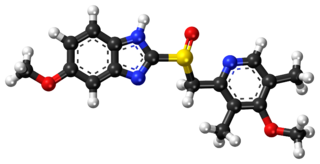
Straw is an agricultural byproduct consisting of the dry stalks of cereal plants after the grain and chaff have been removed. It makes up about half of the yield by weight of cereal crops such as barley, oats, rice, rye and wheat. It has a number of different uses, including fuel, livestock bedding and fodder, thatching and basket making.

Rosuvastatin, sold under the brand name Crestor among others, is a statin medication, used to prevent cardiovascular disease in those at high risk and treat abnormal lipids. It is recommended to be used together with dietary changes, exercise, and weight loss. It is taken orally.

Esomeprazole, sold under the brand name Nexium [or Neksium] among others, is a medication which reduces stomach acid. It is used to treat gastroesophageal reflux disease, peptic ulcer disease, and Zollinger–Ellison syndrome. Its effectiveness is similar to that of other proton pump inhibitors (PPIs). It is taken by mouth or injection into a vein.

Konjac and konnyaku are common names of Amorphophallus konjac, a vegetable species native to Yunnan in southwest China which has an edible corm. It is also known as konjaku, konnyaku potato, devil's tongue, voodoo lily, snake palm, or elephant yam.

Ranitidine, sold under the brand name Zantac among others, is a medication used to decrease stomach acid production. It is commonly used in treatment of peptic ulcer disease, gastroesophageal reflux disease, and Zollinger–Ellison syndrome. It can be given by mouth, injection into a muscle, or injection into a vein.

The Food and Drug Administration's (FDA) New Drug Application (NDA) is the vehicle in the United States through which drug sponsors formally propose that the FDA approve a new pharmaceutical for sale and marketing. Some 30% or less of initial drug candidates proceed through the entire multi-year process of drug development, concluding with an approved NDA, if successful.
Adalimumab, sold under the brand name Humira and others, is a disease-modifying antirheumatic drug and monoclonal antibody used to treat rheumatoid arthritis, juvenile idiopathic arthritis, psoriatic arthritis, ankylosing spondylitis, Crohn's disease, ulcerative colitis, plaque psoriasis, hidradenitis suppurativa, and uveitis. It is administered by subcutaneous injection. It works by inactivating tumor necrosis factor-alpha (TNFα).

Losartan, sold under the brand name Cozaar among others, is a medication used to treat high blood pressure (hypertension). It is in the angiotensin receptor blocker (ARB) family of medication, and is considered protective of the kidneys. Besides hypertension, it is also used in diabetic kidney disease, heart failure, and left ventricular enlargement. It comes as a tablet that is taken by mouth. It may be used alone or in addition to other blood pressure medication. Up to six weeks may be required for the full effects to occur.
Pegfilgrastim, sold under the brand name Neulasta among others, is a PEGylated form of the recombinant human granulocyte colony-stimulating factor (GCSF) analog filgrastim. It serves to stimulate the production of white blood cells (neutrophils). Pegfilgrastim was developed by Amgen.

Candy cigarettes are a candy introduced in the late 19th century made out of chalky sugar, bubblegum or chocolate, wrapped in paper and packaged and branded so as to resemble cigarettes. Some products contain powdered sugar hidden in the wrapper, allowing the user to blow into the cigarette and produce a cloud of sugar that imitates smoke, which comes out of the other end.

Cysteamine is an organosulfur compound with the formula HSCH2CH2NH2. A white, water-soluble solid, it contains both an amine and a thiol functional groups. It is often used as salts of the ammonium derivative [HSCH2CH2NH3]+ including the hydrochloride, phosphocysteamine, and the bitartrate.The intermediate pantetheine is broken down into cysteamine and pantothenic acid.

Rifapentine, sold under the brand name Priftin, is an antibiotic used in the treatment of tuberculosis. In active tuberculosis it is used together with other antituberculosis medications. In latent tuberculosis it is typically used with isoniazid. It is taken by mouth.

A plastic bottle is a bottle constructed from high-density or low density plastic. Plastic bottles are typically used to store liquids such as water, soft drinks, motor oil, cooking oil, medicine, shampoo, milk, and ink. The size ranges from very small bottles to large carboys. Consumer blow molded containers often have integral handles or are shaped to facilitate grasping.

Toxic Waste is a line of sour candies owned and marketed by American company Candy Dynamics Inc., which is headquartered in Indianapolis, Indiana. The products are sold primarily in the United States and Canada as well as several international markets such as the United Kingdom, Ireland and South Africa. The toxic waste candy is packed in novelty drum containers, each holding 16 pieces of sour candy which come in five different flavors.
A biosimilar is a biologic medical product that is almost an identical copy of an original product that is manufactured by a different company. Biosimilars are officially approved versions of original "innovator" products and can be manufactured when the original product's patent expires. Reference to the innovator product is an integral component of the approval.

Linagliptin, sold under the brand name Tradjenta among others, is a medication used to treat type 2 diabetes in conjunction with exercise and diet. It is generally less preferred than metformin and sulfonylureas as an initial treatment. It is taken by mouth.

Tenofovir alafenamide, sold under the brand name Vemlidy, is an antiviral medication used against hepatitis B and HIV. It is used for the treatment of chronic hepatitis B virus (HBV) infection in adults with compensated liver disease and is given in combination with other medications for the prevention and treatment of HIV. It is taken by mouth.

Weed World Candies sells lollipops. The lollipops are marketed and sold in vans across the United States. With advertising on the vans depicting cannabis plants next to lollipops, strong euphemism suggests a cannabis flavor or the possibility of intoxication after eating the lollipops. The candy sold from the vans does not contain THC.

Cabotegravir/rilpivirine, sold under the brand name Cabenuva, is a co-packaged antiretroviral medication for the treatment of HIV/AIDS. It contains cabotegravir and rilpivirine in a package with two separate injection vials.

Nirmatrelvir/ritonavir, sold under the brand name Paxlovid, is a co-packaged medication used as a treatment for COVID‑19. It contains the antiviral medications nirmatrelvir and ritonavir and was developed by Pfizer. Nirmatrelvir inhibits SARS-CoV-2 main protease, while ritonavir is a strong CYP3A inhibitor, slowing down nirmatrelvir metabolism and therefore boosting its effect. It is taken by mouth.
















